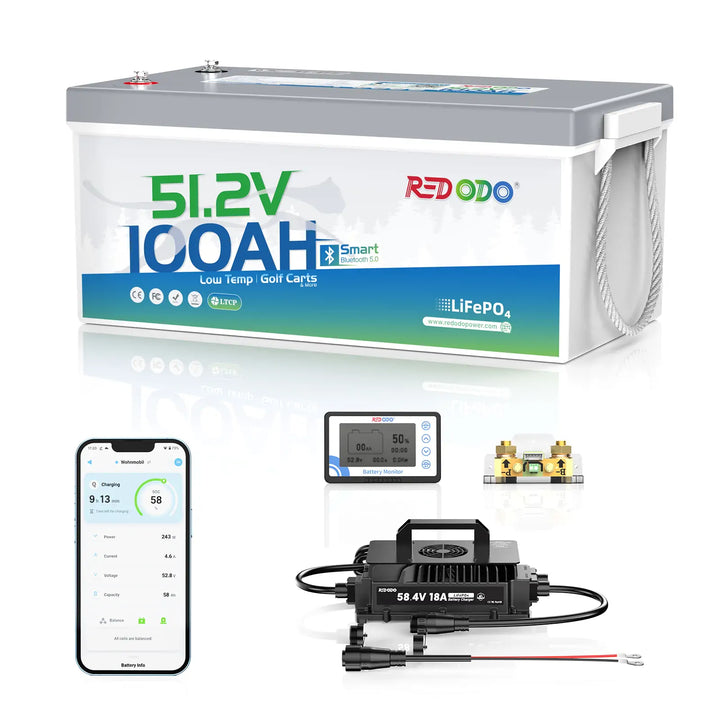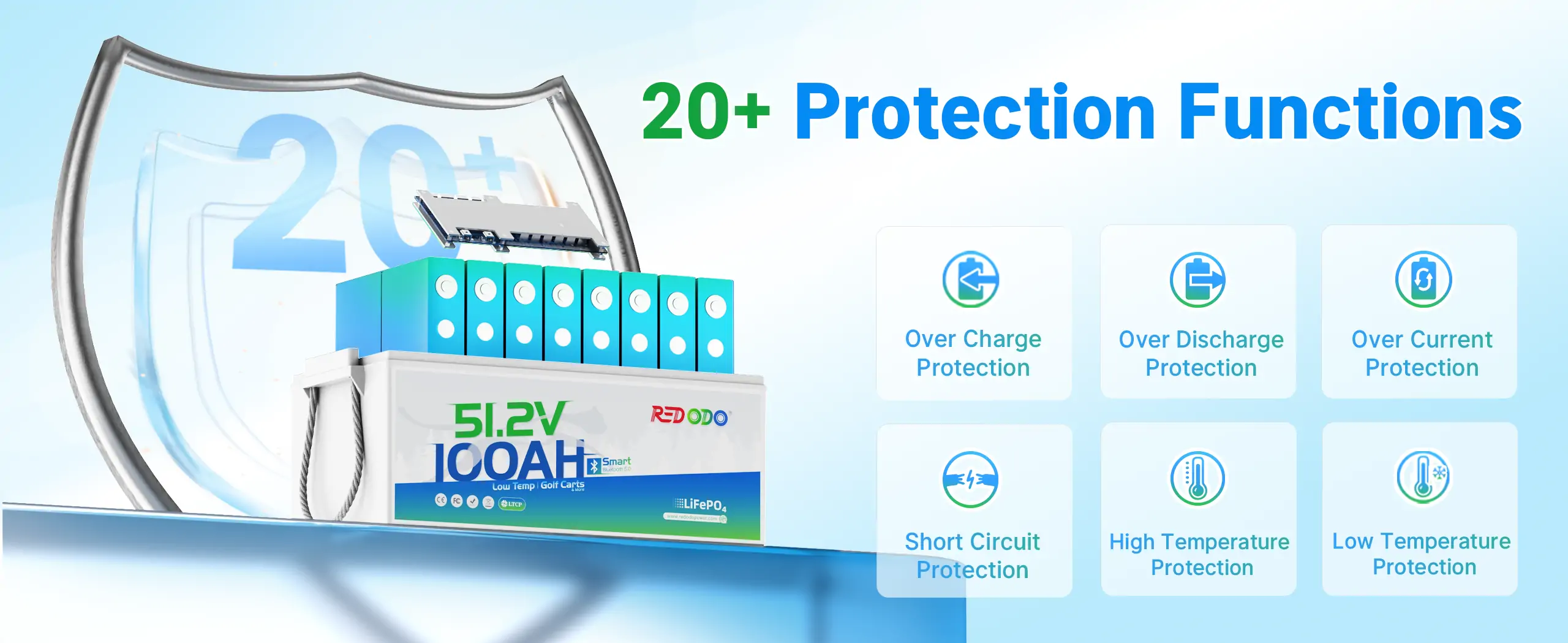Golf cart batteries are critical to performance, range, and longevity. Whether you own a personal cart or manage a fleet, understanding replacement costs ensures informed decisions. This article breaks down pricing for lead-acid, AGM, and lithium-ion batteries for golf carts, explores cost factors, and answers key questions like lithium golf cart battery replacement strategies.
Table of Content
- Average Cost Range for Replacing Golf Cart Batteries
- Factors Affecting the Cost of Golf Cart Battery
- Lead Acid vs. Lithium Iron Phosphate: Are Lithium Batteries Worth It?
- Should I Replace All Golf Cart Batteries At Once?
- Can I Mix LiFePO4 Batteries and Lead Acid Batteries in My Golf Cart?
- How Much Does It Cost to Convert a Golf Cart to Lithium?
- Upgrade Your Golf Cart Battery to Lithium
Average Cost Range for Replacing Golf Cart Batteries
The cost of golf cart batteries varies significantly based on battery chemistry.
Lead-acid batteries are the most affordable upfront, priced at $150–$250 per unit (6V/8V) or $800–$1,500 for a full 36V/48V set. They typically last 2–3 years under moderate use.
AGM (Absorbent Glass Mat) batteries, a sealed lead-acid variant, cost $200-$400 per battery or $1,200–$2,000 for a full set. Their lifespan ranges from 3–5 years.
Lithium-ion batteries (primarily lithium iron phosphate, or LiFePO4) cost $200–$400 per 12V unit or $1,000–$3,000+ for a 48V system.
While lithium batteries have a higher initial cost, they offer longer lifespan and superior energy density, weighing 50%-60% less than lead-acid equivalents. They also charge 3x faster and require zero maintenance.
Factors Affecting the Cost of Golf Cart Battery
Battery Type
Lead-acid batteries dominate the market due to their low initial cost, but their shorter lifespan and maintenance needs (e.g., watering, voltage checks) add long-term expenses.
AGM batteries reduce upkeep but still lag in longevity compared to lithium.
Lithium-ion batteries, while expensive upfront, eliminate maintenance costs and outlast lead-acid by 2–3 times, delivering better ROI over a decade.
Battery Voltage and Capacity
Higher voltage systems (e.g., 48V vs. 36V) and larger capacities increase costs.
For example, a 48V 100Ah lithium golf cart battery costs around $1,000, while a 36V 80Ah AGM battery system averages at $700.
Voltage also determines the replacement required—typically, a 48V golf cart system has higher cost than a 36V system.
Related Reading: LiFePO4 Lithium Battery Voltage Charts
Number of Batteries
A lead-acid golf cart battery system typically requires 4 to 8 batteries to build a 36V or 48V power system for a golf cart to meet its voltage requirements. In contrast, lithium batteries offer a much simpler solution.
You can either connect 3 to 4 lightweight 12V lithium batteries in series or use a single 36V or 48V lithium battery as a direct replacement. This eliminates excess wiring, reduces maintenance, and provides a more efficient power solution.
For example, if your cart is 48V, a 48V lead-acid system needs six 8V batteries, whereas lithium systems often use four 12V units or a 48V pack.
Upgrade to the Redodo 48V Golf Cart Lithium Battery Conversion Kit for a seamless replacement. Say goodbye to bulky lead-acid setups and enjoy a simplified installation with long-lasting performance.
Installation
DIY golf cart battery swaps can save $100–$300 in labor fees, but improper installation risks compatibility issues.
Additionally, lithium retrofits often demand upgraded components, such as a compatible charger and battery holders, adding to the cost of $200-$300.
Maintenance and Warranty
Lead-acid batteries incur annual maintenance costs and shorter warranties (1–3 years).
Lithium batteries, backed by 5–10-year warranties, require no maintenance and offer 4,000+ cycles, compared to lead-acid’s 500–1,000 cycles.
Lead Acid vs. Lithium Iron Phosphate: Are Lithium Batteries Worth It?
LiFePO4 batteries are worth the investment for golf carts despite their higher upfront cost.
While a 48V lithium battery system may cost higher than lead-acid, the long-term savings and performance benefits outweigh the initial expense.
For example, over a decade, the total cost of ownership looks like this:
- Lead-acid: $1,200 (initial) + $1,200 (first replacement) + $1,200 (second replacement) + $500 (maintenance) = $4,100
- Lithium: $2,000 (initial) + $300 (components) + $0 (maintenance) = $2,300
Additionally, LiFePO4 golf cart batteries deliver twice the energy density of lead-acid batteries while weighing just one-third as much. They also perform well in extreme temperatures (-4°F to 140°F) and charge faster when idle. More importantly, their 8–10-year lifespan eliminates the need for costly replacements.
Should I Replace All Golf Cart Batteries At Once?
Replacing all batteries simultaneously is strongly recommended.
Mixing old and new batteries creates voltage imbalances, forcing newer units to overcompensate for weaker ones. This strain shortens the lifespan of the entire battery set. Partial replacements may save money short-term but risk premature failure and void warranties.
Lithium conversions require full-system upgrades, as lead-acid chargers and wiring are incompatible. Even within lead-acid types, mixing AGM and FLA batteries can degrade performance due to differing charge profiles.
Can I Mix LiFePO4 Batteries and Lead Acid Batteries in My Golf Cart?
No, you should not mix LiFePO4 batteries and lead-acid batteries in your golf cart.
These two battery types have different voltages, charge/discharge characteristics, and internal resistances, which can lead to performance issues, safety risks, and battery damages.
- Different Charging Modes: Lead-acid batteries require a different charging profile than LiFePO4, and using a single charger for both can result in improper charging, overcharging, or undercharging.
- Voltage Imbalance: LiFePO4 batteries maintain a higher and more stable voltage, while lead-acid voltage may drops during discharge. This imbalance can cause uneven power distribution and premature wear.
- Risk of Damage: The mixed setup can strain both battery types, reducing efficiency and leading to potential overheating or failure.
Related Reading: How to Charge LiFePO4 Battery
How Much Does It Cost to Convert a Golf Cart to Lithium?
The total cost of converting a golf cart to lithium typically ranges from $1,500–$4,000+, depending on battery brand, capacity, additional components, and installation.
Battery Pack: A 48V 100Ah LiFePO4 battery costs $1,000–$3,000, depending on brand and capacity.
Additional Components: Upgraded chargers ($200–$400), high-gauge wiring ($50–$150), and a battery management system (BMS) ensure safe operation.
Installation: Professional installation costs $100–$300, including system testing and software calibration. Alternatively, you can opt for a DIY installation to save on costs.
Upgrade Your Golf Cart Battery to Lithium
Upgrade golf cart with the Redodo 48V Golf Cart Lithium Battery Conversion Kit, offering exceptional value and performance! The kit includes a 48V 100Ah lithium golf cart battery, a matching charger, and a 500A battery monitor with shunt, saving you both time and cost.
Designed for seamless compatibility with major golf cart brands like Club Car, EZGO, ICON, and Yamaha, this kit ensures a hassle-free transition from lead-acid to lithium power.
Plus, Redodo battery provides a 5-year warranty and 10-year technology support—so if you have any questions during installation or use, we’re here to help!

Conclusion
The cost to replace golf cart batteries hinges on chemistry, voltage, and labor. Lead-acid remains the budget-friendly choice, but lithium’s longevity, efficiency, and maintenance-free operation make it a wise investment for frequent users. By prioritizing quality and long-term value, you’ll maximize your golf cart’s reliability and lifespan.
For people who want to upgrade golf cart power to lithium, Redodo 48V battery conversion kit is the most affordable one-stop solution. For more information about upgrading your golf cart or for the best budget golf cart batteries, visit Redodo today!
Read More:
Difference Between 48V and 51.2V Golf Cart Batteries

Redodo

Redodo
Recent Post

Convert RV from Lead-Acid to Lithium Battery: A Complete Guide

How Long Will a 200Ah Battery Run an Air Conditioner?

A Full Review of Redodo 12V 140Ah Group 31 Deep Cycle Battery

How Much Does it Cost to Replace Golf Cart Batteries?





![⚡[$975 after Sign-Up] Redodo 48V 100Ah Bluetooth Golf Cart Lithium Battery Conversion Kit | For Golf Cart, Marine, Solar Home](http://www.redodopower.com/cdn/shop/files/Redodo_51.2V_100ah_golf_cart_lithium_battery.webp?v=1744708779)

![⚡[$294 after Sign-Up] Redodo 12V 140Ah Group 31 Lithium Battery with Bluetooth | 40% More Capacity | For RV, Marine, Solar Home](http://www.redodopower.com/cdn/shop/files/Redodo_12V_140ah_bluetooth_battery_ee6d5fd1-5c7d-4b9a-90ab-d54d06b29a04.jpg?v=1742967763)
![⚡[$220 after Sign-Up] Redodo 12V 100Ah Group 24 Deep Cycle LiFePO4 Lithium Battery | For Home, RV, Marine](http://www.redodopower.com/cdn/shop/files/Redodo_12V_100Ah_group_24_lithium_battery_6301965d-f6e8-467f-825f-3eec839b3e1f.jpg?v=1744105344)
![⚡[$220 after Sign-Up] Redodo 12V 100Ah LiFePO4 Lithium Battery | Best Budget | For RV, Solar, Trolling Motor](http://www.redodopower.com/cdn/shop/files/Redodo_12v_100ah_lithium_battery_b9015ddd-64b5-4be2-8c88-392f0bb4ab30.jpg?v=1742973160)
![⚡[$239 after Sign-Up] Redodo 12V 100Ah Group 24 Bluetooth LiFePO4 Battery | Real-Time Battery Monitoring | For RV, Marine, Solar](http://www.redodopower.com/cdn/shop/files/Redodo_12V_100Ah_group_24_bluetooth_lithium_battery.jpg?v=1744253032)
![⚡[$220 after Sign-Up] Redodo 12V 100Ah Group 31 Bluetooth Lithium Battery | Real-Time Battery Monitoring | For RV, Marine, Solar](http://www.redodopower.com/cdn/shop/files/redodo_12v_100ah_bluetooth.webp?v=1744698930)
![⚡[$524 after Sign-Up] Redodo 12V 300Ah Lithium LiFePO4 Battery | Replaces 6*12V 100Ah AGM Batteries | RV, Marine, Solar](http://www.redodopower.com/cdn/shop/files/Redodo_12V_300ah_lithium_deep_cycle_battery.png?v=1744797523)
![⚡[$487 after Sign-Up] Redodo 12V 280Ah Bluetooth Lithium Battery | Low Temp Protection | For RV, Marine, Solar](http://www.redodopower.com/cdn/shop/files/Redodo-12V-280Ah-LiFePO4-Bluetooth-battery.jpg?v=1742812722)